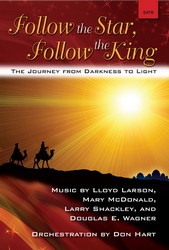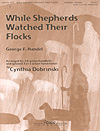Scripture References:
st. 1 = Luke 2:8-9
st. 2 = Luke 2:9-10
st. 3 = Luke 2:11-12
st. 4 = Luke 2:12
st. 5 = Luke 2:13
st. 6 = Luke 2:14
The story of the shepherds and the angels is told in this famous paraphrase of Luke 2:8-14 by Nahum Tate (b. Dublin, Ireland, 1652; d. Southwark, London, England, 1715). It was first published in 1700 in a supplement to the New Version of the Psalms by Tate and Nicholas Brady. Tate's straightforward telling of the nativity story is an example of paraphrasing at its best: poetry that conveys the text well without undue liberties or additions and is easy to understand and sing. Adopted by virtually all hymnals since its writing, this narrative song simply tells the Christmas gospel as the shepherds heard it. A similarly narrative song based on the same gospel text is at 339.
Although born in Ireland, Tate spent all of his adult life in London, where he was known primarily as a playwright and poet. Most of his dramas were not original plays but adaptations of the works of others. Honored by being named poet laureate in 1692, Tate wrote poetry celebrating important national events. He was also appointed the official royal historian in 1702. Intemperate throughout his life, Tate died while living at the Suffolk House, a refuge for debtors in London, In the history of church music Tate and Brady are known for their New Version (1696), which replaced the "Old Version" of Sternhold and Hopkins published by John Day in 1562. Reprinted frequently and supplemented with some hymns, the new versification became the standard psalter of the Church of England and influenced psalmody well into the nineteenth century.
Liturgical Use:
Christmas; stanza 5 makes an excellent doxology for the two Sundays following Christmas.
--Psalter Hymnal Handbook
==========================
While shepherds watched their flocks by night. N. Tate. [Christmas.] Appeared in the Supplement to the New Version, in 1702, in 6 stanzas of 4 lines, and in all later editions of the same. In full, or in an abbreviated form, it is found in most hymn-books in English-speaking countries. Original text in the Hymnal Companion. In addition to the original, two additional versions are in common use:—
1. While humble Shepherds watched their flocks. This was given in the 1745 Draft of the Scottish Translations and Paraphrases, the opening stanza reading:—
"While humble Shepherds watch'd their Flocks
in Bethleh'ms Plains by Night,
An Angel sent from Heav'n appear'd
and fill'd the Plains with Light."
The alterations were confined to this stanza. On its adoption in the revised Draft of 1751, and again in the authorized issue of the Translations and Paraphrases, 1781, the concluding lines of the last stanza read:—
Goodwill is shewn by Heav'n to men,
and never more shall cease."
This arrangement of the text has been in common use for more than 100 years.
2. On Judah's plains as Shepherds kept. This is found in one or two American collections only.
The original has been translated into several languages. Those in Latin include; (1) "Pastorum in pecudes noctu vigilante catervâ," by Lord Lyttelton, 1866; and (2) "Noctivagos. acclinis humo, pastoria pubes," by C. S. Calverley, both in L. C. Biggs's annotated edition of Hymns Ancient & Modern, 1867; (3) "Oves dum custodientes," by R. Bingham, in his Hymnologia Christiana Latina, 1871; and (4) "Pro grege Pastores vigilabant nocte silenti," by Bishop Wordsworth (St. Andrews) in his Series Collectarum, &c, 1890.
--John Julian, Dictionary of Hymnology (1907)


 My Starred Hymns
My Starred Hymns








